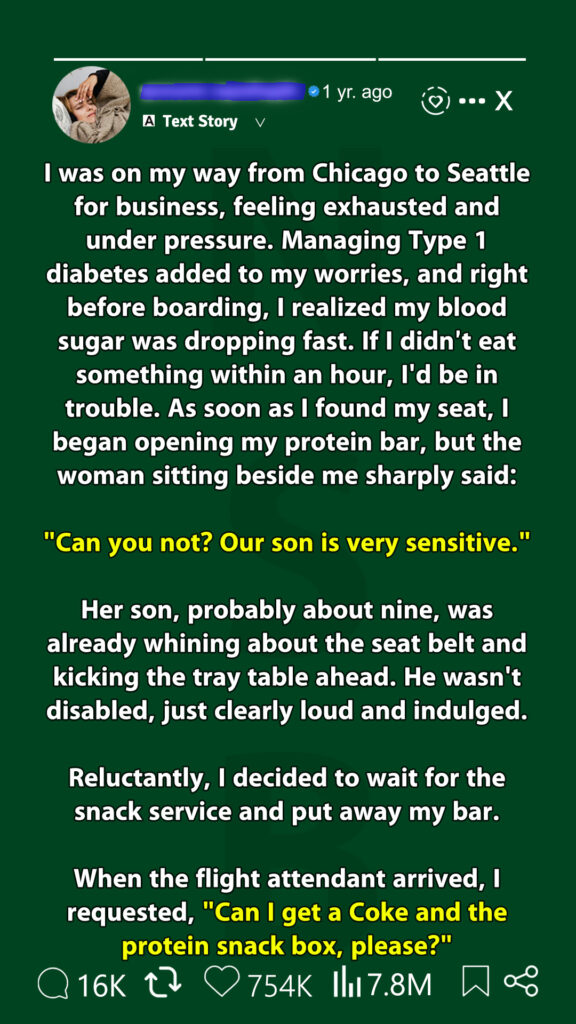I’ve flown to fourteen cities in the past year. I’ve pitched campaigns in boardrooms, eaten breakfast in hotel lobbies, and learned how to sleep through turbulence. But nothing prepared me for the moment I was told I couldn’t eat on a plane—because a child might throw a tantrum.
I’m Elizabeth. Thirty-two. Marketing consultant. Type 1 diabetic. And someone who’s learned to navigate life with both ambition and insulin.
I was diagnosed at twelve. Since then, my life has been a balancing act—between deadlines and glucose levels, between independence and vigilance. I don’t wear my condition like a badge, but I don’t hide it either. I carry glucose tablets in every purse. I set alarms for insulin doses. And I always pack snacks when I travel. Always.

On a flight from Chicago to Seattle, I boarded with my usual routine: seat by the window, protein bar in my bag, insulin pen tucked into my carry-on. I was halfway through a podcast when I felt my blood sugar dip. I reached for my snack.
That’s when the woman in the row behind me leaned forward.
“Excuse me,” she said, tight-lipped. “Would you mind not eating? My son gets upset when he sees food he can’t have.”
I blinked. “I’m sorry, but I need to eat. I’m diabetic.”
She frowned. “Can’t you wait? He’ll throw a tantrum.”
I looked at the boy. He was about five, glued to a tablet, surrounded by snacks of his own. This wasn’t about scarcity. It was about control.
“I really can’t wait,” I said gently. “It’s a medical necessity.”
She scoffed. “You people always have an excuse.”
I felt my hands tremble—not from low blood sugar, but from rage.
I turned to the flight attendant and explained the situation. She nodded, offered me juice, and assured me I could eat whenever I needed. But the mother wasn’t done.
She muttered loudly about “entitled passengers” and “attention seekers.” Her husband joined in, saying I should “respect their parenting.”
That’s when I stood up.
“I respect your parenting,” I said, voice steady. “But I won’t risk my health to protect your child from seeing a protein bar. If tantrums are part of his development, that’s your journey—not mine.”
The row went silent. A few passengers nodded. One woman whispered, “Good for you.”
I sat down, ate my snack, and stabilized my blood sugar.
Later, the flight attendant returned with a note. It read: “Thank you for standing up. My daughter has Crohn’s. People don’t understand. You made her feel seen.”
I cried quietly into my ginger ale.
This wasn’t just about a snack. It was about the right to exist without apology. About invisible illnesses and the strength it takes to advocate for yourself in a world that often demands silence.
I didn’t teach those parents a lesson with anger. I taught it with truth. And I reminded myself—and others—that dignity isn’t negotiable.


